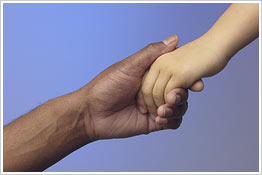Love Heals Prejudice
By Marjorie F. Eddington
Categories: Peer Pressure Have you ever heard negative comments said about you, even to you, based on your ethnicity? I have. In middle school my Latino classmates made fun of my light skin and took any opportunity to insult me and physically harass me. Even through high school, I continued to be a minority and endured considerable "reverse discrimination." It got to the point that I would avoid large groups of my peers because of their negative comments and actions. I would come home from school very angry or in tears. I asked my parents for help. And they reminded me that in Sunday school I was taught to follow the Bible, and that the Bible would help me.
 Sometimes it is hard to remove yourself from a problem. At first I thought, "How are the experiences of those people over 2000 years ago going to help me with my classmates now?" But after reading several stories in the Bible, I learned that these were wonderful examples of how God saved people and led them to understand that we should see each other as "brothers" and "sisters," as children of God. Sometimes it is hard to remove yourself from a problem. At first I thought, "How are the experiences of those people over 2000 years ago going to help me with my classmates now?" But after reading several stories in the Bible, I learned that these were wonderful examples of how God saved people and led them to understand that we should see each other as "brothers" and "sisters," as children of God.
The first phrase I came across as I studied was:
Lo, this only have I found, that God made man upright, but they have sought out many inventions. (Eccl. 7:29)
This made me realize that a prejudiced thought or attitude was an "invention" of man, not of God. So, prejudice wasn't a Godlike image.
The next helpful insight was from the book of Mark:
Love your neighbor as thyself. (Mark 12:33)
In situations of prejudice, it is easier to love yourself rather than your neighbor. But this statement is a demand, and it points out that if you love your neighbor the way you love yourself, you cannot have a negative perception of your neighbor. Once I was able to love my classmates because they were my neighbors, their negative behavior began to lessen. We did not become friends, but the name-calling began to stop.
I continued to study the Bible, reading more about God's care for his creation. The story of the three Hebrew boys, Shadrach, Meshach, and Abed-nego (Dan. 3:19-26) spoke to me. Even though they were faithful, they were forced into a fiery furnace. But God sent them an angel, and they were not harmed. Like these three boys, I was in a furnace - a mental furnace. Their story reminds us to be watchful for angels, for angels answer our heartfelt and honest prayers. Once I learned that the flames of hatred could not harm me because God was protecting me, I was able to love my classmates, even though I did not have to love their behavior.
Lastly, one of Jesus' beatitudes offered hope:
Blessed are the peacemakers, for they shall be called the children of God. (Matt. 5:9)
Being a peacemaker and not an instigator of conflict promotes resolution and understanding. I found that if I was not loving my neighbor, I could not be a peacemaker, and I could not experience a positive atmosphere at school. Once I did love them, my thought became harmonious. I no longer felt that I had to think of a competent retort at every whim to retaliate to a negative comment. Over the following years, I began to see myself and others as pure and loved. This new perspective and greater sense of love allowed me to stop feeling like a victim. I no longer felt as though I would be harassed. My experience at school became tolerable, and the prejudice became less apparent and diminished.
The common element of all these citations is that God preserves his children. If we are experiencing prejudice or becoming a victim of it, the best solution is to get a better view of our "brothers" and "sisters," - to see them as God's loved children.
Only through God's love was I able to overcome prejudice. |